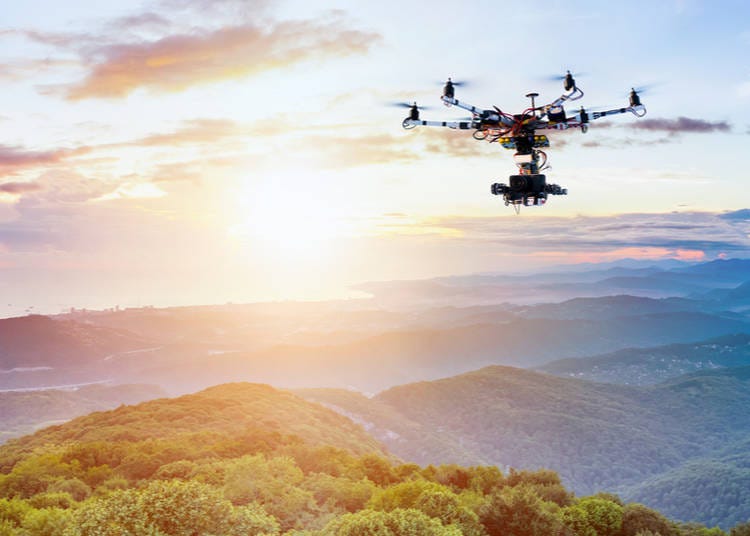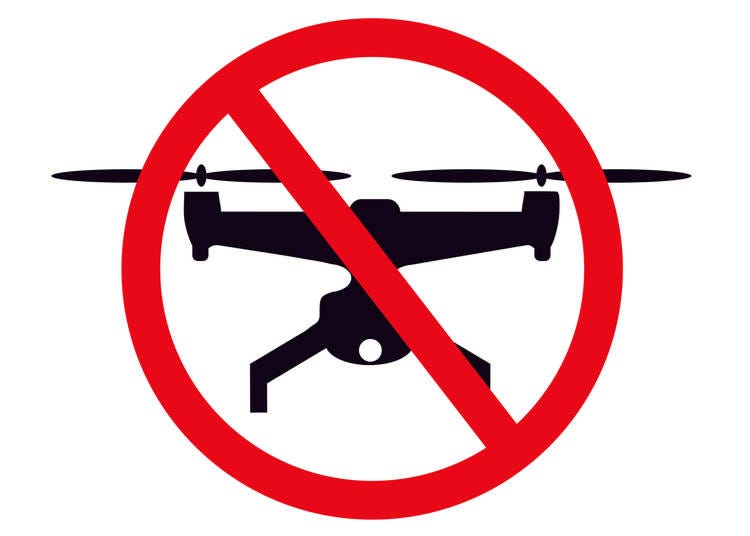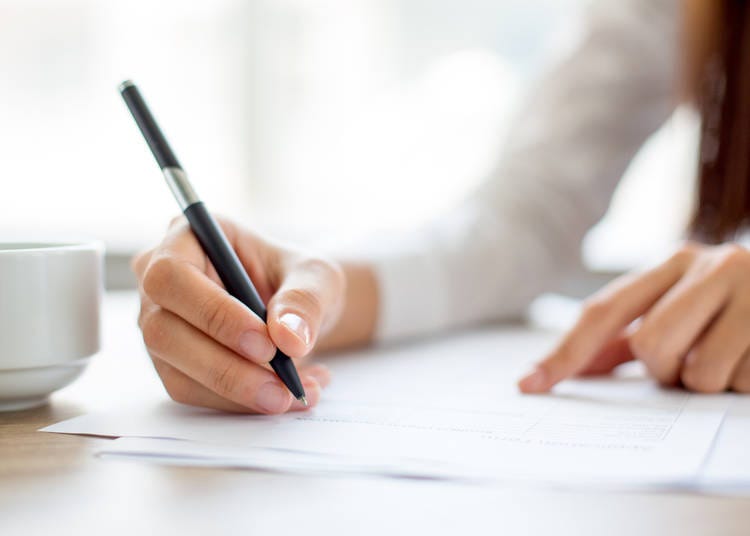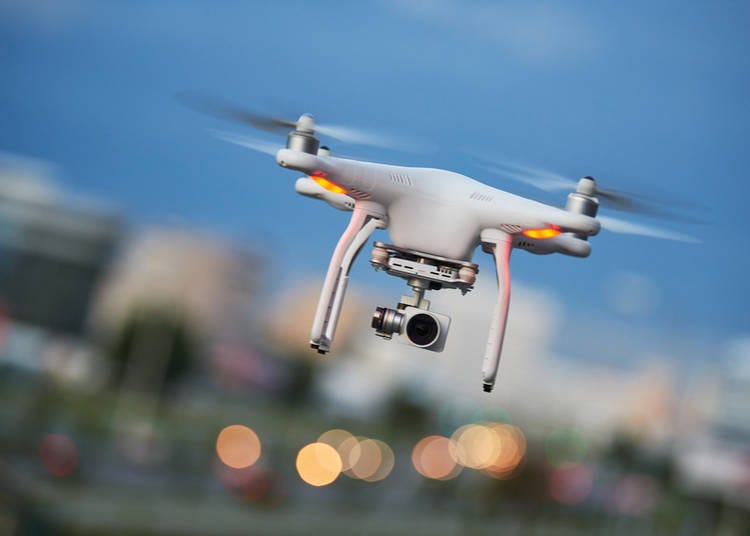
Complete Guide to Flying Drones in Japan: Etiquette, Laws, and Understanding No-Fly Zones
- Written by: Nao
Drones allow you the easiest access to the view of the landscape from heights. So, you can take a picture of where you can't physically enter in, or from the angle impossible to reach yourself.
But what are the laws about drones in Japan? Here we explain the ins and outs of flying a drone in Tokyo and around the Japanese countryside!
1. What are Japan’s drone laws?

Generally speaking, most areas around large cities such as Tokyo and Osaka are either no-fly zones or require special permission.
1. Drones in Japan Must NOT fly above 150 meters (492 feet)
You need permission and you must arrange with the air control center of which is in charge of the area when you'd like to fly a drone over 150 meters from the ground or any water surfaces such as the ocean, a lake or a river.
You'll find the contact of the air control center of each area in the link below.
→ http://www.mlit.go.jp/koku/koku_tk10_000004.html (in Japanese only)
2. Must NOT fly nearby airports
Every airport has the controlled airspace set by the minister of Land, Infrastructure and Transport.
You can find a map indicating the controlled airspace of airports in the following links:
→ http://www.mlit.go.jp/en/koku/ (English)
→ http://www.mlit.go.jp/koku/koku_tk10_000004.html (details in Japanese)
The height allowance depends on each airport. Please inquire to the manager of the airport or who’s in charge.
3. Must keep at least 30 meters (98 feet) away from people, buildings and vehicles
You must request approval to operate a drone within the distance of 30 meters from people, buildings and vehicles.
4. Must NOT fly at night
You can only fly a drone between the sunrise and the sunset. If you want to fly it during the night, you need to get approval beforehand.
5. Must always maintain Visual Line of Sight (VLoS) when operating the drone
Some drones may come with a pair of goggles, which you can see the real-time view from the drone. However, in Japan, you must always observe the drone with your eye, and you must get approval if you'd like to operate a drone by using the goggles.
6. Must NOT transport hazardous materials such as explosives on the drone
You must request approval when you’d like to transport hazardous materials such as explosives, fireworks, etc.
7. Must NOT drop any objects from the drone
This also includes any sort of liquids. If you’d like to drop anything from the drone, you need to acquire approval beforehand.
8. Must NOT be flown in any of Metropolitan Tokyo’s 81 public parks and gardens
It is forbidden to operate any drones no matter how small/light it is in any of Metropolitan Tokyo's 81 public parks and gardens. This is non-negotiable, and no permission request will be accepted.
9. Must NOT fly over the densely populated areas like cities (4,000 people per square kilometer or more)
Again, it means you cannot fly a drone without permission in most areas in Tokyo. You can check which city is defined as 'highly densely populated area', which is marked in red, in the map linked below.
→ http://maps.gsi.go.jp/#10/35.667338/139.800339/&base=std&ls=std%7Cdid2015%7Ckokuarea&blend=0&disp=111&lcd=kokuarea&vs=c1j0h0k0l0u0t0z0r0s0m0f0
10. Must NOT fly over festivals and events
You need to acquire approval if you wish to fly over festivals and events, no matter how big/small these festivals/events are.
Festivals and events here are defined as 'what is held on the date and at the place settled in advance, and it does not include any crowds that spontaneously occur, such as a group of people waiting for the traffic light to turn green.'
11. Must NOT fly in and around the restricted sites
You must not fly a drone within the restricted sites and around (no closer than approximately 300 meters) without permission. The restricted sites include followings:
・The National Diet Building (国会議事堂/Kokkai-gijido)
・Prime Minister's Official Residence (内閣総理大臣官邸/Naikaku Soridaijin kantei)
・Supreme Court of Japan (最高裁判所/Saiko saibansho)
・Imperial palace (皇居/Ko kyo)
・Any other governmental facilities
・Any other important national facilities
・Ministry of Foreign Affairs of Japan (外国公館/Gaikoku kokan)
・Nuclear power plant and surrounding area
*Note that the above is not an exhaustive list of regulations pertaining to drones in Japan
2. Penalties: Japan drone fines

The Civil Aeronautics Act (the aviation law in Japan) will apply if you fly a drone which weighs over 200g. You will be fined 500,000 yen or less for a breach of the law.
This is not the only penalty you would expect. There are also possibilities that you may be accused of being against the Road Traffic Act, Act on Protection of Cultural Properties, etc. Furthermore, you also should be aware of the chance that you may be caught for the invasion of privacy.
Although the punishment and the fine vary, you should always bear in mind that it is possible you may end up in jail at least for a month or being fined 50,000 yen at least if you are against any part of the law.
3. Do I need permission to fly a drone in Japan? Checklist

1. Does your drone weigh under 200 grams?
If your drone weighs under 200 grams, you don't need approval on condition that you won't break the must-follow rules in section 1 above.
However, you still need permission if you want to fly a drone 1) around an airport, 2) above 150 meters, 3) over the densely populated areas.
2. Do you want to fly in (a) airspace around airport, (b) above a densely populated area, (c) airspace above specified AGL?
If so, you need permission by the Minister of Land, Infrastructure and Transport (MLIT).
・To fly a drone around an airport, above 150 meters or over the densely populated areas: Contact an airport that is in charge of the area.
・In other cases: Contact a local Aviation Bureau.
4. How to apply for permission/approval to fly a drone in Japan

You need to request permission/approval at least 10 working days before the date you wish to fly a drone. You can send the application via post or online system. You can also bring it to the office yourself. The application form sent by email and FAX is generally not accepted unless it is an emergency such as under a natural calamity.
1. Via post
a. Download application form
You can download the application form on the website of the Ministry of Land, Infrastructure and Transport below.
・http://www.mlit.go.jp/koku/koku_fr10_000042.html
Click the linked text "無人航空機の飛行に関する許可・承認申請書" and download. (Available only in Japanese)
b. Fill out, send via mail
The application form must be filled out in Japanese.
The office address to send it varies depending on where you are planning to operate a drone.
・East Japan (Niigata/Nagano/Shizuoka Prefecture or further east), contact Tokyo koku kyoku (東京航空局).
〒102-0074 東京都千代田区九段南 1-1-15 九段第 2 合同庁舎 東京航空局保安部運用課 無人航空機審査担当
(Mujin-kokuki shinsa tanto
1-1-15 Tokyo koku-kyoku Hoan-bu Unnyo-ka, Kudan Dai2 Godo-chosha, Kudanminami, Chiyoda-ku, Tokyo 〒102-0074)
FAX:03-5216-5571
*Strongly suggest writing the address in Japanese when you send a mail.
・West Japan (Toyama/Gifu/Aichi Prefecture or further west), contact Osaka koku kyoku (大阪航空局).
〒540-8559 大阪府大阪市中央区大手前 4-1-76 大阪合同庁舎第4号館 大阪航空局保安部運用課 無人航空機審査担当
(Mujin-kokuki shinsa tanto
4-1-76 Osaka koku-kyoku Hoan-bu Unnyo-ka, Osaka godo-chosha Dai 4 go-kan, Ootemae, Chuo-ku, Osaka-shi, Osaka 〒540-8559)
FAX: 06-6920-4041
*Strongly suggest writing the address in Japanese when you send a mail.
・Around an airport/above 150 meters/over the densely populated areas, contact the airport that is in charge of the area.
Note: You need to enclose another envelope and stamps if you wish to have the written permission/approval in the paper.
2. Electronically (Website)
You can also request permission/approval through the online system 'DIPS'.
https://www.dips.mlit.go.jp/portal/ (Available only in Japanese)
Firstly, you need to create an account by registering information about the registrant, the drone and the operator of the drone. Then you can start filling out the application form and send it through the internet.
Note: You still need to send it by 10 days before the drone operation day.
a. Receive feedback from MLIT
You might receive correction requests from MLIT.
b. Make any needed changes and resubmit
If you received any correction requests, log on to DIPS and correct your application accordingly.
c. When approved, you’ll receive an email.
You will then be able to download the electronic written permission via DIPS if you opted for it during application. Or, you'll receive the paper written permission via post if you opted for it. In this case, you need to send a stamped envelope to the office that issues the document.
Note: No matter which type of the written permission you opt, you must always carry it with you during the operation of the drone.
3. Depending on location where you want to fly, you may have to get local property permission in addition to MLIT
According to the law, the private property states that it includes the midair above the land. Hence, you need to ask for permission beforehand to the owner(s) of the place(s) you want to fly a drone. The private property also includes public transports' stations and rail tracks, temples, shrines, schools, fields, riversides, forests, mountains and so on.
4. Applications must be in Japanese
As mentioned above, the application form to send to MLIT must be written in Japanese. Also, the online application system DIPS is only provided in Japanese, and all inquiries must be written in Japanese as well.
5. FAQ

1. Are drones illegal in Japan?
They are not illegal. However, there is the law, rule and procedure, which are quite strict, for the drone operator to follow. So, it is highly advisable to check all the aspects that you should be careful about.
2. Can I fly a drone in Tokyo?
Yes. However, as most of the areas in 23 wards are marked as 'highly densely populated area', you may need to request permission in many cases. You may also need approval as well depending on how and where you would like to fly a drone.
You can still fly a drone without permission in some areas in Tokyo where are not highly densely populated and within the rule which does not require permission/approval. Also, please make sure a place is not private property, and if so, ask the owner in advance to avoid troubles.
6. Helpful links and resources
DJI Flight Maps
・https://www.dji.com/en/flysafe/geo-map
MLIT
・http://www.mlit.go.jp/koku/koku_fr10_000042.html
A Japanese writer who is from a city by the sea. Started writing from the age of ten. Since then, pen and notebook have always been the best friend. Loves travelling, tea, and books.
*Prices and options mentioned are subject to change.
*Unless stated otherwise, all prices include tax.
Popular Tours & Activitiess
Recommended places for you
-

Kambei Sannomiyahonten
Yakiniku
Kobe, Sannomiya, Kitano
-

Kanzenkoshitsuyakinikutabehodai Gyugyu Paradise Sannomiya
Yakiniku
Kobe, Sannomiya, Kitano
-

ISHIDAYA Hanare
Yakiniku
Kobe, Sannomiya, Kitano
-
Goods

Yoshida Gennojo-Roho Kyoto Buddhist Altars
Gift Shops
Nijo Castle, Kyoto Imperial Palace
-

Jukuseiniku-to Namamottsuarera Nikubaru Italian Nikutaria Sannomiya
Izakaya
Kobe, Sannomiya, Kitano
-
Appealing

Rukku and Uohei
Izakaya
Sapporo / Chitose
-

Jujutsu Kaisen Takes Over JR East With a Wrapped Shinkansen This Winter
by: Guest Contributor
-

Strawberries, Style, and Tokyo’s Coolest Neighborhood: Winter Afternoon Tea in Kichijoji
by: Guest Contributor
-

This Winter, Godzilla Takes Over Haneda Airport
by: Guest Contributor
-

How to Get Don Quijote's Exclusive 2025-2026 Winter Gift (+Tax-Free Savings)
-

Japan’s Shinkansen Is About to Change Travel in an Unexpected Way
by: Guest Contributor
-
Ad

(Opening in Jan 2026) 'THE SUMO LIVE RESTAURANT HIRAKUZA GINZA TOKYO!' 5 Exciting Ways to Experience the World of Sumo!
-

38 Best Things to Do in Sendai & Miyagi: Sightseeing, Food, Shopping & Souvenirs
by: Guest Contributor
-

Tokyo Tower vs. Tokyo Skytree: Closeup Look at Tokyo's Two Iconic Towers
-

Ikebukuro Station Area Guide: Top 15 Spots When You Escape the Station's Maze!
-

Racing Across Japan in the Joetsu Shinkansen: From Tokyo to Niigata's Sake Country In Style
-

Japan Winter 2025: National Holidays, Seasonal Festivals & Must-See Spots
by: Chien-Huang
-

9 Ski Resorts Near Osaka That'll Have You Booking Your Winter Getaway (2024-25 Season)
by: WESTPLAN
- #best sushi japan
- #what to do in odaiba
- #what to bring to japan
- #new years in tokyo
- #best ramen japan
- #what to buy in ameyoko
- #japanese nail trends
- #things to do japan
- #onsen tattoo friendly tokyo
- #daiso
- #best coffee japan
- #best japanese soft drinks
- #best yakiniku japan
- #japanese fashion culture
- #japanese convenience store snacks













